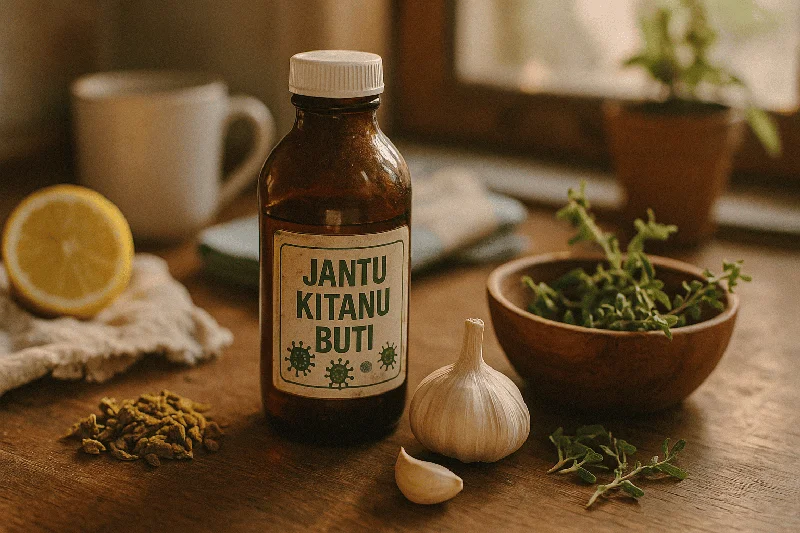Ask Ayurvedic doctor a question and get a consultation online on the problem of your concern in a free or paid mode. More than 2,000 experienced doctors work and wait for your questions on our site and help users to solve their health problems every day.
Jantu Kitanu Buti: Ayurvedic Approach to Eliminate Germs and Pathogens Naturally

Germs and pathogens (jantu kitanu) have always been a significant concern for human health. They are the root cause of various infections and diseases, ranging from mild colds to severe life-threatening conditions. In a world dominated by chemical disinfectants and antibiotics, it is worth exploring natural, sustainable solutions like jantu kitanu buti – an Ayurvedic remedy designed to combat germs and pathogens effectively.
Ayurveda, the ancient Indian science of life, emphasizes a holistic approach to health by utilizing herbs, natural remedies, and lifestyle changes. Jantu kitanu buti represents a group of herbs and formulations known for their potent antimicrobial and immunity-boosting properties. These remedies not only eliminate harmful germs but also enhance the body's natural defense mechanism to prevent future infections.
Understanding Jantu Kitanu Buti
The term "jantu kitanu buti" refers to a category of Ayurvedic herbs and preparations specifically targeting germs, bacteria, and viruses. These remedies are rooted in the Ayurvedic philosophy of balancing the body’s doshas (Vata, Pitta, and Kapha) to promote overall health and well-being.
Unlike synthetic antibiotics, which often come with side effects and contribute to antibiotic resistance, jantu kitanu buti provides a natural, side-effect-free way to cleanse the body of pathogens. These herbs also support detoxification, reduce inflammation, and repair damaged tissues, offering a comprehensive solution to microbial threats.
Top Ayurvedic Herbs for Jantu Kitanu Buti
Neem (Azadirachta indica)
Neem is a well-known antibacterial, antifungal, and antiviral herb in Ayurveda. Its leaves, bark, and oil are used to treat skin infections, purify the blood, and eliminate harmful microbes. Regular use of neem-based remedies can prevent recurrent infections and maintain hygiene.
Tulsi (Ocimum sanctum)
Tulsi, or holy basil, is revered in Ayurveda for its powerful germicidal properties. The herb is effective against a wide range of pathogens and is particularly beneficial for respiratory infections. Tulsi tea or fresh leaves can help boost immunity and protect against seasonal illnesses.
Turmeric (Curcuma longa)
Turmeric is a potent antimicrobial and anti-inflammatory spice. Its active compound, curcumin, inhibits the growth of bacteria and viruses. Consuming turmeric with milk or applying turmeric paste externally can help combat infections and promote faster healing.
Giloy (Tinospora cordifolia)
Giloy is often referred to as the "root of immortality" due to its immune-boosting properties. It is highly effective in fighting off bacteria, viruses, and other pathogens, making it a staple in the jantu kitanu buti category. Giloy juice or capsules can strengthen immunity and improve overall health.
Amla (Phyllanthus emblica)
Amla, or Indian gooseberry, is a rich source of Vitamin C and antioxidants. It helps detoxify the body, fight infections, and improve digestion. Regular consumption of amla juice or powder can significantly reduce the risk of infections.
Ayurvedic Practices for Eliminating Germs
Steam Inhalation with Medicinal Herbs
Inhaling steam infused with herbs like eucalyptus, tulsi, and neem helps clear respiratory passages and kill airborne pathogens. This simple practice is particularly effective during flu seasons.
Detoxification with Panchakarma
Panchakarma therapies in Ayurveda focus on cleansing the body of toxins and pathogens. Treatments like virechana (therapeutic purgation) and nasya (nasal cleansing) can help in eliminating harmful germs from the body.
Use of Herbal Disinfectants
Ayurvedic formulations like neem oil, turmeric paste, and tulsi decoctions can be used as natural disinfectants for cleaning wounds, surfaces, or even purifying water.
Jantu Kitanu Buti: Preventive Care
Prevention is always better than cure, and Ayurveda emphasizes strengthening the body's natural defenses to ward off infections. Here are some tips to incorporate jantu kitanu buti into your daily routine:
- Diet: Include immunity-boosting foods like garlic, ginger, and turmeric in your meals.
- Hygiene: Use herbal soaps and cleansers made with neem, tulsi, or aloe vera.
- Lifestyle: Practice regular yoga and pranayama to enhance lung capacity and overall immunity.
- Supplements: Take Ayurvedic supplements containing giloy, amla, or ashwagandha to maintain robust health.
Conclusion
Jantu kitanu buti provides a natural and effective way to combat germs and pathogens without relying on synthetic chemicals or antibiotics. By incorporating Ayurvedic herbs and practices into your lifestyle, you can protect yourself and your family from infections while promoting holistic well-being.
Embrace the wisdom of Ayurveda and let jantu kitanu buti be your ally in the fight against germs. Start today, and experience the difference that natural remedies can make in your life.

